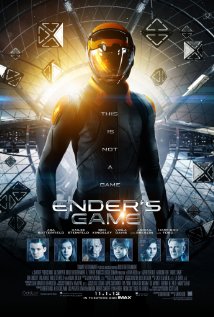Sci-fi, 114 Minutes, 2013
Let’s start with the elephant in the room: Orson Scott Card, author of “Ender’s Game”, is an asshat. This is a man that, when contemplating government recognition of gay marriage, said “I will act to destroy that government and bring it down.” He also defends the non-science of Intelligent Design and evidence against Climate Change as victims of scientific dogmatists.
So, he’s an asshat, but an asshat that wrote a great story. Sure, it’s also true that he had no idea when to stop writing that story and so we have a novelization, many sequels and the same story re-told from multiple viewpoints but in his defense, it was a really good story. One that, for the most part, was turned into a pretty good – but not great – movie.
Asa Butterfield [IMDB] plays Ender Wiggin, a child prodigy being groomed for military command to defend Earth from a hive-minded race of aliens. Harrison Ford [IMDB] is Colonel Graff, the tough veteran in charge of the training school who pushes Ender to, and past, his limits. Children are recruited for their quickness of mind and malleability but must be harshly managed, and often broken, to be of use.
The movie follows the plot of the book closely with only a few understandable omissions and consolidations. There were some odd changes, presumably and sadly, to simplify the plot for theatrical audiences. The movie ignored the relativistic realities that made the technology and tactics of the book so interesting. The ending, especially, was unfortunately rushed and muddled. It lacked the emotional depth and examination of exploration of ramifications that made the original ending so powerful. This ending simply had too much Hollywood and not enough heart.
The biggest problem with the movie was that it often spent more time telling us things than showing us things. We’re told that Ender is doing well and we’re told how he’s feeling. Actual demonstrations of this would have been more powerful and in the end the movie fails to truly convince us of Ender’s greatness. Even the battle room, perhaps the most iconic element of the book, seemed somewhat glossed over and rushed. Rushed is a word that applies to many aspects of the movie. Even the overall timeline, covering several years in the book, feel compressed, as if the collected events took only a few months.
Butterfield and Ford have excellent onscreen chemistry and the broken father-son relationship that they develop feels authentic. Most of the other actors do a fine job although none of the supporting characters are given any real depth. Characters given huge roles in the book, such as Ender’s siblings and several of his confidants, are glossed over nearly completely. Other characters only seem to get lines in service of heavy-handed exposition.
The movie looks great and can, with a little determination, be enjoyed purely as a popcorn effects flick. For all its issues the movie still does what good science-fiction should: provide a safe window through which we can examine our own motivations and biases. It doesn’t do this as well as the book, but that’s to be expected. Its smart, thoughtful sci-fi and there’s always room for more of that at a table crowded with teenage love triangles and giant-mega-sharkaquakes.

